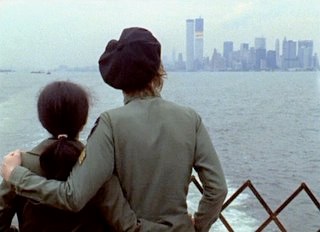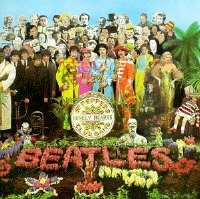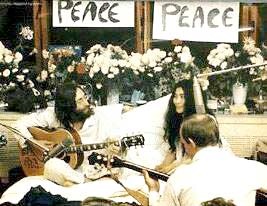Writing Samples

John Lennon died 25 years ago on December 8th, but I spent the afternoon with him last week in Paris.
The Cité de la Musique in the capital’s 19th arrondisment has an exhibition until June 25 called “John Lennon: Unfinished Music.” It chronicles Lennon’s extraordinary life from his childhood through to his death with artifacts, photos, films, and music—lots of great music.
“Guitars are okay as a hobby, John,
but you’ll never make a living at it.”
- John Lennon’s aunt
Lennon was abandoned by his parents. His father, a merchant seaman, just took off to sea during World War II. His mother gave him to his aunt and uncle to raise when he was six. Although he reestablished a relationship with her in his late teens, she was killed by a drunken driver--ironically an off duty policeman--a few years later.
As with everything else in his life, this shows up in his music.
Mother, you had me, but I never had you.
I wanted you, but you didn’t want me.
So I got to tell you
Goodbye, goodbye.
Mama, don’t go.
Daddy, come home.
“Mother”
Album: Plastic Ono Band (1970)
In school, he was a goof-off. His report cards have teacher comments like: “A good start rather spoilt by inattention and childish behaviour,” and “Childish and a chatterbox.” His headmaster said of John when he was 12, “When he can learn to control himself, he will make good progress all around. At the moment, he concentrates on the things he enjoys doing.” Thankfully, Lennon continued to concentrate on what he liked to do rather than knuckle under to conformity.
His years with the Beatles are recounted in classic clips of their appearances on the Ed Sullivan show, their last concert at Candlestick Park in San Francisco, scenes from A Hard Day’s Night, Help, Magical Mystery Tour, and the animated Yellow Submarine. His costume from the classic cover shot on Sgt. Pepper’s is on display along with other clothing. And here you will find the guitars he used in his years with the Quarrymen, the Silver Beatles and the Beatles.
In a separate section on another floor, however, we run into the real John Lennon, the John Lennon who wanted to change the world for the better. These are the years of his solo career, the Yoko years. There is a replica of John’s famous white grand piano from the Lennon-Ono apartment in the Dakota building in Manhattan. And you’ll find copies of John’s handwritten lyrics for some of his best songs, complete with words crossed out and lines rewritten.
By this point in his life, Lennon didn’t have to please anyone with his music but himself. He made the music he cared about, and if it sold, great. If not, that’s life. As a result, there’s not a “Yeah, Yeah, Yeah” in sight. Every piece is either stridently political or intensely, embarrassingly personal.
It was in these years that he began to say he was Irish, not English. He had two Irish grandparents, and those were the roots with which he began to identify. After British troops killed fourteen protesters in Londonderry on “Bloody Sunday,” he wrote:
A thousand years of torture and hunger
Drove the people away form their land,
A land full of beauty and wonder
Was raped by the British brigands!
The Luck of the Irish
Album: Some Time in New York City (1972)
The BBC banned the song.
As I wandered through the remnants of the last ten years of his life, I was reminded of what a powerful force he had been for peace if by nothing more than nagging us about it.
All we are saying is give peace a chance.
“Give Peace a Chance”
Album: Shaved Fish (1975)
It was a simple message, but one he lived in his music and in his life.
My two or three hours immersed in John's world got me to wondering: where are the angry young people of today? What is wrong with them? Doesn’t it bother them that the President of the United States cooked up phony intelligence to get America into a phony war? Aren’t they outraged that he looked them in the eye and lied to them about “weapons of mass destruction” to create an excuse, a straw man, so he could pound his chest and pull gullible National Guardsmen away from their jobs and families, all so their well-to-do neighbors could drive two SUVs instead of one?
Jean Chretien said, “I kiss no one,” and turned aside the very strident demands from Washington that we join them in their latest quagmire. Our chosen role in the world has been keeping the peace. We have only fought when it was absolutely necessary. Ten days before visiting John, I had been at Juno Beach in Normandy where Canadian soldiers had landed in World War II, a war in which peace had no chance. But those were different times, times John lived through as a child. I can’t pretend to speak for him. I honestly wonder how he would have felt about that war had he been an adult at the time. I think perhaps, even then, John Lennon would have been in the streets, bullhorn in hand, leading the march.
We weren’t perfect in the 60s. We did too many drugs. We …. Well, we did too many drugs. But we sure as hell knew when to get angry. I remember standing in a crowd chanting: “Hell no! We Won’t Go!” And we didn’t. Some of us, like Joan Baez’ husband David Harris, went to jail rather than be drafted, and guys like him were heroes to the rest of us. Others of us came to Canada and made new lives for ourselves.
Young people around the world, not just in the United States, marched against the war in Vietnam. In France, they brought down De Gaulle’s government. In the US, we campaigned for Eugene McCarthy and forced Lyndon Johnson from office.
But it came at a cost. Students marched at Kent State University and the National Guard gunned them down. Michael Schwerner, James Chaney, and Andrew Goodman traveled to Mississippi to register black voters—just to register voters 100 years after the slaves had been freed—and the KKK murdered them and buried their bodies in an earthen dam.
But we got off our asses and did something about the world.
And in his music and in his actions, John Lennon was leading the way.
There’s room at the top
They are telling you still.
But first you must learn
To smile as you kill.
“Working Class Hero”
Album: Plastic Ono Band (1970)
Who is out there giving us the message of peace today? Doesn’t anyone have courage any more? Maybe the hate mongers have won. Maybe we have finally learned the lesson: Preach peace and die.
Martin Luther King said, “I have a dream,” and he was murdered.
Mahatma Ghandi said, “I am prepared to die, but there is no cause for which I am prepared to kill,” and he was murdered.
Jesus told us, “Love your neighbor as yourself,” he was murdered.
John Lennon asked us to “Give peace a chance,” and he was murdered.
Somebody out there has a very large vested interest in hate.
Imagine all the people
Sharing all the world…
You may say I am a dreamer
But I’m not the only one.
I hope someday you’ll join us,
And the world will be as one.
“Imagine”
Album: Imagine (1971)
Rest in Peace, John. We miss you.


Where Are You John? We Need You.
Published in: The Globe and Mail
April 8, 2006
Posted on: The Coast Road Travel Blog
Nov. 10, 2005

